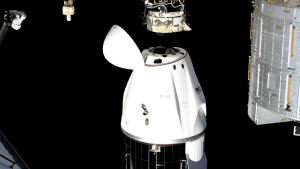NASA's stuck astronauts are finally on their way back to Earth after 9
months in space
[March 18, 2025]
By MARCIA DUNN
CAPE CANAVERAL, Fla. (AP) — NASA’s two stuck astronauts headed back to
Earth with SpaceX on Tuesday to close out a dramatic marathon mission
that began with a bungled Boeing test flight more than nine months ago.
Butch Wilmore and Suni Williams bid farewell to the International Space
Station — their home since last spring — departing aboard a SpaceX
capsule alongside two other astronauts. The capsule undocked in the wee
hours and aimed for a splashdown off the Florida coast by early evening,
weather permitting.
The two expected to be gone just a week or so after launching on
Boeing’s new Starliner crew capsule on June 5. So many problems cropped
up on the way to the space station that NASA eventually sent Starliner
back empty and transferred the test pilots to SpaceX, pushing their
homecoming into February. Then SpaceX capsule issues added another
month’s delay.
Sunday’s arrival of their relief crew meant Wilmore and Williams could
finally leave. NASA cut them loose a little early, given the iffy
weather forecast later this week. They checked out with NASA’s Nick
Hague and Russia’s Alexander Gorbunov, who arrived in their own SpaceX
capsule last fall with two empty seats reserved for the Starliner duo.
“We'll miss you, but have a great journey home,” NASA's Anne McClain
called out from the space station as the capsule pulled away 260 miles
(418 kilometers) above the Pacific.

Their plight captured the world’s attention, giving new meaning to the
phrase “stuck at work.” While other astronauts had logged longer
spaceflights over the decades, none had to deal with so much uncertainty
or see the length of their mission expand by so much.
Wilmore and Williams quickly transitioned from guests to full-fledged
station crew members, conducting experiments, fixing equipment and even
spacewalking together. With 62 hours over nine spacewalks, Williams set
a new record: the most time spent spacewalking over a career among
female astronauts.
[to top of second column]
|

This image taken from NASA video shows the SpaceX capsule carrying
NASA astronauts Suni Williams, Butch Wilmore and Nick Hague, and
Russian astronaut Alexander Gorbunov, undocking from the
International Space Station on Tuesday, March 18, 2025. (NASA via
AP)

Both had lived on the orbiting lab before and knew the ropes, and
brushed up on their station training before rocketing away. Williams
became the station's commander three months into their stay and held
the post until earlier this month.
Their mission took an unexpected twist in late January when
President Donald Trump asked SpaceX founder Elon Musk to accelerate
the astronauts’ return and blamed the delay on the Biden
administration. The replacement crew’s brand new SpaceX capsule
still wasn’t ready to fly, so SpaceX subbed it with a used one,
hurrying things along by at least a few weeks.
Even in the middle of the political storm, Wilmore and Williams
continued to maintain an even keel at public appearances from orbit,
casting no blame and insisting they supported NASA’s decisions from
the start.
NASA hired SpaceX and Boeing after the shuttle program ended, in
order to have two competing U.S. companies for transporting
astronauts to and from the space station until it's abandoned in
2030 and steered to a fiery reentry. By then, it will have been up
there more than three decades; the plan is to replace it with
privately run stations so NASA can focus on moon and Mars
expeditions.
Both retired Navy captains, Wilmore and Williams stressed they
didn’t mind spending more time in space — a prolonged deployment
reminiscent of their military days. But they acknowledged it was
tough on their families.
Wilmore, 62, missed most of his younger daughter’s senior year of
high school; his older daughter is in college. Williams, 59, had to
settle for internet calls from space to her mother. They’ll have to
wait until they’re off the SpaceX recovery ship and flown to Houston
before the long-awaited reunion with their loved ones.
All contents © copyright 2025 Associated Press. All rights reserved |